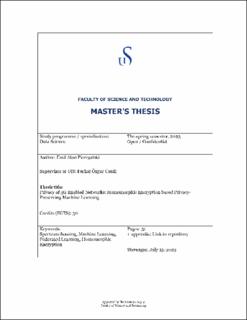| dc.description.abstract | Homomorphic encryption (HE) is a technique that allows computations to be
performed on encrypted data, just as if the data were unencrypted. This has
numerous potential applications, such as sensitive medical data, mainly when
privacy and anonymity are critical. HE can also be used in cases where multiple
parties need to perform computations on shared data without revealing the
data to one another. One fascinating application of HE is in machine learning,
specifically in a process known as federated learning (FL). FL is a cutting-edge
method that is particularly useful in situations where privacy is essential, as it
eliminates the need for data to be shared with a central server, as is the case
with traditional distributed machine learning models. However, privacy risks
are associated with sharing model parameters, as inference attacks can obtain
sensitive information. This issue can be addressed by encrypting the model
parameters with HE on the client side and aggregating the encrypted data.
In this paper, we explore federated learning with homomorphic encryption to
improve the privacy of 5G networks. The results of our experiments show that
encryption has a minimal effect on the the predictive performance of the model,
but leads to an increase in computation time by 587 %, 624 % and 679 % for
2, 5, and 7 clients, respectively. | |
